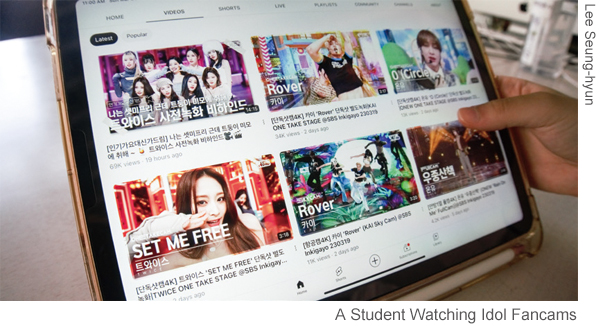
Recently, the Korean Wave has been more evident than ever before. Korean pop culture such as K-food, K-beauty, and K-drama have been popular, but K-pop especially has become the hottest trend. As K-pop became popular internationally, many people all around the world began to pay attention to the fandom culture in South Korea.
“Fandom” is a term that describes people who are deeply into a certain person or a brand. The term is a compound of “fanatic,” a word that describes a person who is extremely interested in something, and a suffix “dom,” which means a group or a crowd. Fandoms in Korea create their own cartels, supporting their loving idols.

The first-generation Korean idols emerged in the 2000s, specifically, between 1994 and 2003. The first-generation fans lacked ways to directly communicate with their idols. The official website managed by the company was the only way to communicate with celebrities, and fans usually supported celebrities by watching broadcasts and going to concerts.
Nowadays, fandom culture has grown more productive and participatory. After the 2000s, the media began to develop, and some social media platforms such as Instagram, Facebook, and Twitter were launched. Beginning with the second-generation of idols who gained popularity between 2004 and 2013, it became possible to support celebrities in various ways.
Text voting for the K-pop charts, music streaming, purchasing goods, and commenting on social media became available. Starting from the third-generation (2014-2018) into the current fourth-generation, the media developed dramatically, and the latest idols began communicating with their fans more closely than ever. People even began to participate in producing an idol group by voting on TV shows like PRODUCE 101 or BOYS PLANET, which is a survival audition program that creates a new idol group.
As such, the relationship between Korean idols and fandoms became amazingly close. The idols and fans began to have direct communication with each other via some platforms and face-to-face. DearU Bubble is one of the most famous online platforms showing their close relationships.
The platform “Bubble” is a 1:1 online communication chat room system. Celebrities can send messages through the chat room, and the fans can get the message and write back to idols. The celebrities can receive the message back, but they can only send a message to all fans, not individually. Nevertheless, many people subscribe to this application because it is designed like a 1:1 chat room, thus giving the feeling of having direct communication. Fans can also get their idol’s unreleased pictures or videos.
Weverse is also a popular online-metaverse platform where K-pop idols and fans can communicate in a form of social media, and most celebrities in Korea use Weverse. Usually, it is used as a live streaming platform; fans can communicate with their idols in real time by commenting on the video. Fan signing events, where the idols give out autographs to the fans in person, are also part of the fandom culture in Korea. When fans buy an album, they get the opportunity to apply for a fan signing event.
They get one vote for an album, so a lot of people buy dozens of albums to be selected. After being selected, fans can have a real conversation with their favorite idols, and they can also give some gifts. During the fan signing event, many idols wear some accessories, glasses, or headbands they were given by their fans.
As the relationship between idols and fandoms has become so close, some problems have also arisen. Once the interest toward the celebrity gets too extreme, the interest may develop into an obsession. If individuals create their own cartel and join the fandom, they experience a sense of unity and might act out.
Therefore, if something happens to their favorite idols, they could act violently to save them. Korean fandoms also step into idols’ private dating lives. As some fans consider an idol member their lover, they may invade the idols’ private life and try to control it when they find out their idols are dating. They write comments about their disappointment and frustration about dating through social media.

Lou-Anne Angeline Rennard (Dept. of English Language and Literature, ’22), a foreign student at the University of Seoul (UOS) who is from France, gave The UOS Times her opinions on the fandom culture in South Korea.
“I personally do not think it is good to step into the private life of idols. This kind of thing keeps happening because the companies of the celebrities almost do nothing to stop the behavior that crosses the line. Also, some people think that celebrities can do nothing and cannot exist without fans, so they tend to think celebrities should accept everything the fandom wants. I think fandom culture is too extreme sometimes.”
“However, I do not think the relationship between the celebrity and fandom is too close compared to other countries. Most of the time, except for being too extreme, I think it is just a normal relationship between a fan and a celebrity. Giving nice gifts to their favorite idols seems pretty nice and cute.”
Fandom definitely gives motivation to and has a good influence on both celebrities and fans. However, if love toward K-pop idols gets too extreme, it causes many problems, and this can be expressed negatively toward others. To create a healthy fandom culture, it is necessary to make a distinction between public and private matters.
Fandom should respect celebrities’ privacy by viewing them as independent individuals, not as a product, and giving them boundless love, but not following them blindly or obsessively.
Lee Seung-hyun
nicole3212@uos.ac.kr

